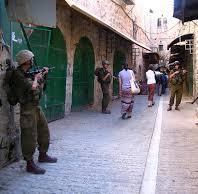IDF Rabbi Places Mezuzah in Hebron Old City
The IDF is considering taking disciplinary action against an army rabbi who affixed a mezuza to an entranceway to the Hebron marketplace on Monday.
The rabbi of the IDF Yehuda Brigade, Capt. Eliyahu Peretz, joined several soldiers, Jewish residents of Hebron and Chabad followers and entered the Hebron "casbah" - the city's old marketplace and off-limits to Jews - to affix a mezuza on a wall of a structure which they claimed once belonged to Jews.
In response, Peace Now issued a statement condemning the event, insisting that "those who participated in this illegal political ceremony should be put on trial."
The Hebron casbah is defined as a "closed military zone" and security forces forbid Israeli civilians from entering it.
Sources in the Central Command said Yehuda Brigade Commander Col. Yossi Fuchs was investigating the incident. The mezuza has been removed. They also said that Peretz had been in his position for only one month and had affixed the mezuza in the volatile area unaware of the potential fallout.
Rabbi Yossi Nachshon, a Chabad emissary in Hebron who helped organize the ceremony, said he did not understand the IDF's extreme reaction.
"The media and the IDF have totally blown the whole thing out of proportion," said Nachshon. "We affixed the mezuza in a place where IDF soldiers are stationed near a Jewish neighborhood. We do these types of things all the time. On the same day we affixed mezuzot in various settlements around the Hebron hills."
Nachshon said that according to Jewish law there was no obligation to affix a mezuzah near the casbah. However, he added that a mezuza was believed to offer protection against physical dangers.
Nachshon said that a Jewish settler had been killed near the scene of the contentious mezuza.

The Talmud says that a mezuzah should not be placed on the gates of a city in which both Jews and non-Jews live because of "danger". Rashi says the danger is that the non-Jews will think the Jews are practicing witchcraft. It seems that in light of this news, we can add an additional explanation to Rashi: that the non-Jews will think the Jews are planning to take over the city!
The fact that in our case no Jews at all live in the city, and the fact that the settlers claim that the building once belonged to Jews, certainly add to that appearance.
Besides the fact that they are provoking the 160,000 Arab residents of Hebron, the idea that Jews should be allowed to reclaim a building they allegedly owned 80 years ago, before the 1929 uprising, can only hurt the Zionists, for by the same logic the Palestinian refugees could lay claim to land they were forced out of only 60 years ago.